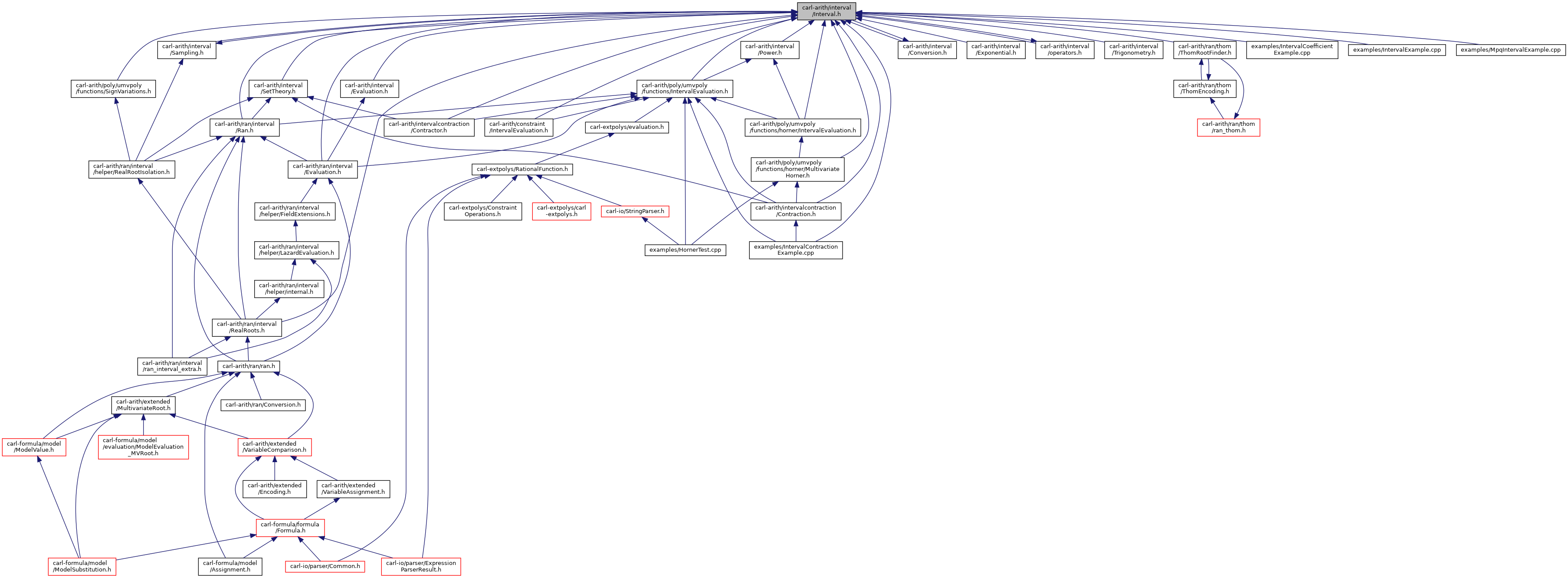Interval.h File Reference
#include <carl-arith/core/Sign.h>#include <carl-arith/core/Variable.h>#include <carl-arith/numbers/numbers.h>#include <carl-common/util/hash.h>#include <carl-common/meta/platform.h>#include <carl-common/meta/SFINAE.h>#include "BoundType.h"#include "policies/checking.h"#include "policies/rounding.h"#include <boost/numeric/interval.hpp>#include <boost/numeric/interval/interval.hpp>#include "Sampling.h"#include <cassert>#include <cmath>#include <limits>#include <list>#include <map>#include <sstream>#include "typetraits.h"#include "operators.h"#include "Interval.tpp"#include "Conversion.h"
Include dependency graph for Interval.h:

This graph shows which files directly or indirectly include this file:

Go to the source code of this file.
Data Structures | |
| struct | carl::is_interval_type< carl::Interval< Number > > |
| struct | carl::is_interval_type< const carl::Interval< Number > > |
| struct | carl::policies< Number, Interval > |
| Struct which holds the rounding and checking policies required for boost interval. More... | |
| struct | carl::policies< double, Interval > |
| Template specialization for rounding and checking policies for native double. More... | |
| struct | carl::LowerBound< Number > |
| struct | carl::UpperBound< Number > |
| class | carl::Interval< Number > |
| The class which contains the interval arithmetic including trigonometric functions. More... | |
| struct | carl::is_number_type< Interval< T > > |
| struct | std::hash< carl::Interval< Number > > |
Specialization of std::hash for an interval. More... | |
Namespaces | |
| carl | |
| carl is the main namespace for the library. | |
Macros | |
| #define | BOUNDS_OK(lower, lowerBoundType, upper, upperBoundType) (lowerBoundType == BoundType::INFTY || upperBoundType == BoundType::INFTY || lower <= upper) |
| Macro to perform a quick check on the passed interval bounds. More... | |
| #define | IS_EMPTY(lower, lowerBoundType, upper, upperBoundType) (((lowerBoundType == BoundType::STRICT && upperBoundType != BoundType::INFTY) || (lowerBoundType != BoundType::INFTY && upperBoundType == BoundType::STRICT)) && lower == upper) |
| Macro to perform a quick check for emptiness of the interval. More... | |
| #define | IS_UNBOUNDED(lower, lowerBoundType, upper, upperBoundType) (lowerBoundType == BoundType::INFTY && upperBoundType == BoundType::INFTY) |
| Macro to perform a quick check if the interval is unbounded. More... | |
Functions | |
| template<typename Number > | |
| std::ostream & | carl::operator<< (std::ostream &os, const LowerBound< Number > &lb) |
| template<typename Number > | |
| std::ostream & | carl::operator<< (std::ostream &os, const UpperBound< Number > &lb) |
| template<typename Number > | |
| bool | carl::is_integer (const Interval< Number > &n) |
| template<typename Number > | |
| bool | carl::is_zero (const Interval< Number > &i) |
| Check if this interval is a point-interval containing 0. More... | |
| template<typename Number > | |
| bool | carl::is_one (const Interval< Number > &i) |
| Check if this interval is a point-interval containing 1. More... | |
| template<typename Number > | |
| Interval< Number > | carl::div (const Interval< Number > &_lhs, const Interval< Number > &_rhs) |
| Implements the division which assumes that there is no remainder. More... | |
| template<typename Number > | |
| Interval< Number > | carl::quotient (const Interval< Number > &_lhs, const Interval< Number > &_rhs) |
| Implements the division with remainder. More... | |
| template<typename Integer , typename Number > | |
| Integer | carl::to_int (const Interval< Number > &_floatInterval) |
| Casts the Interval to an arbitrary integer type which has a constructor for a native int. More... | |
| template<typename Number > | |
| Interval< Number > | carl::abs (const Interval< Number > &_in) |
| Method which returns the absolute value of the passed number. More... | |
| template<typename Number > | |
| Interval< Number > | carl::floor (const Interval< Number > &_in) |
| Method which returns the next smaller integer of this number or the number itself, if it is already an integer. More... | |
| template<typename Number > | |
| Interval< Number > | carl::ceil (const Interval< Number > &_in) |
| Method which returns the next larger integer of the passed number or the number itself, if it is already an integer. More... | |
Macro Definition Documentation
◆ BOUNDS_OK
| #define BOUNDS_OK | ( | lower, | |
| lowerBoundType, | |||
| upper, | |||
| upperBoundType | |||
| ) | (lowerBoundType == BoundType::INFTY || upperBoundType == BoundType::INFTY || lower <= upper) |
Macro to perform a quick check on the passed interval bounds.
Definition at line 147 of file Interval.h.
◆ IS_EMPTY
| #define IS_EMPTY | ( | lower, | |
| lowerBoundType, | |||
| upper, | |||
| upperBoundType | |||
| ) | (((lowerBoundType == BoundType::STRICT && upperBoundType != BoundType::INFTY) || (lowerBoundType != BoundType::INFTY && upperBoundType == BoundType::STRICT)) && lower == upper) |
Macro to perform a quick check for emptiness of the interval.
Definition at line 151 of file Interval.h.
◆ IS_UNBOUNDED
| #define IS_UNBOUNDED | ( | lower, | |
| lowerBoundType, | |||
| upper, | |||
| upperBoundType | |||
| ) | (lowerBoundType == BoundType::INFTY && upperBoundType == BoundType::INFTY) |
Macro to perform a quick check if the interval is unbounded.
Definition at line 155 of file Interval.h.